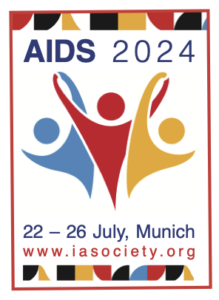IAS 2024: Open letter to IAS over online access
1 September 2024. Related: Editorial, Conference reports, World AIDS 25 Munich 2024.
Simon Collins, HIV i-Base
 Access to the IAS AIDS 2024 international conference has now been slightly relaxed to include non-delegates who are IAS members.
Access to the IAS AIDS 2024 international conference has now been slightly relaxed to include non-delegates who are IAS members.
Broader open access is still restricted to everyone else.
There is still no open access to the opening and closing ceremonies that set the political weight of the meeting and summarise the key studies at the close.
It is difficult to see how this policy relates to the conference theme of “putting people first”.
The open letter below is a lightly edited version of an email sent to IAS just after the conference.
i-Base reports from AIDS 2024 are linked here:
https://i-base.info/htb/keyword/aids-25th-munich-2023
Open letter to IAS over access to conferences online
Dear IAS
Thank you again for organising such a strong programme for AIDS 2024.
It was an incredible achievement as always – and as always we came away with so much from this being an in-person meeting that is also easy to access online.
As usual we both post programme highlights to community treatment lists and activist forums during the conference week that probably cover 3-4,000 people linked through various community email lists and activist forums.
The positive feedback includes that people who are not able to get to the conferences appreciate being included and like to hear about the range of sessions and research, even when they are not able to attend in person.
It was difficult then, to not be able to include links to webcasts for even the general sessions, which would be of the highest community interest and the least contentious in terms of access to clinical science data that is perhaps the commercial reason that you limit access only to delegates.
Even in recent years, we thought IAS has generally made the opening and closing ceremonies open access immediately after the event, sometimes through the programme and sometimes on YouTube. These sessions included the community activists Jay Mulucha and Anton Basenko this year who brought their lived experiences to drive the important social and political values of these world conferences – but their contributions are also blocked from immediate open access to the communities they are from.
The rapporteur summaries should really also be available as open access so that anyone who wasn’t able to attend can be alerted to the key issues selected by the IAS rapporteurs in the concentrated talks that they spent all week preparing so well.
All that work and effort, including by the researchers and participants in research, should at least be able to have a little more access in real time.
IAS is also arguably missing the main audience who want to access this material while it is still fresh and relevant. For us, being able to post live links with post-conference community reports is far more likely to lead to the webcasts being seen now rather than in two months when the news has moved on to the next conference and the relevance is lost. Other people can then build on their work now while everything is connected freshly to the conference. We also noticed this year that even when some webcasts are available to delegates, some of the meetings, including the IAS pre-conference Global Cure workshop, only have some of the sessions available as webcasts.
Please, do you think as a minimum, IAS could consider making the opening and closing ceremonies available now as open access, including the rapporteur summaries? The links are already live for delegates so it just involves lifting those restrictions.
Perhaps opening all conference material after four weeks at the same time that it becomes available to IAS members might generate wider use without affecting membership rates. Most IAS members might already have membership from attending conferences, rather than subscribing separately, so perhaps this wouldn’t affect income.
Perhaps some tracks could be released earlier than others, maybe the excellent co-chair session and tracks linked to human rights or policy? Or those with greatest community input.
As community delegates we are already spread very thinly each year and there is such a short window when the presentations are in the news, before the next headlines come from the autumn conferences.
It is important to be able to signpost to the original presentations and to connect people to the excitement of science and medicine at which these conferences always excel.

